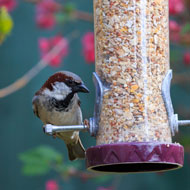House sparrows top RSPB Birdwatch survey

The house sparrow remains the UK’s most commonly-sighted bird.
Recent results from the RSPB’s Big Garden Birdwatch survey show the house sparrow remains the UK’s most commonly-sighted bird.
Figures released by the charity show there were some 1.2 million sightings of the bird throughout the survey weekend. But for many species, fewer birds were recorded than in 2018.
Held during the last weekend in January, the event shows there was a decrease in garden sightings of wrens and long-tailed tits. In 2019, long-tailed tits decreased by more than 27 per cent and wrens by 17 per cent.
RSPB believes populations of both species may have been affected by last year’s ‘Beast from the East’ but say it is still too early to say if this is a one-off or the start of a new trend.
The RSPB Big Garden Birdwatch is now in its 40th year and offers an opportunity for people of all ages to count the number of birds that visit their garden. This year, around half-a-million people across the UK took part in counting 7.5 million birds.
RSPB conservation scientist Daniel Hayhow said: “Over its long lifetime, the survey has shown the increasing good fortunes of birds such as the goldfinch and wood pigeon and the alarming declines of the house sparrow and starling. But there appears to be good news for one of these birds.
“While the overall decline in house sparrow numbers, reported by participants, since the Big Garden Birdwatch began is 56 per cent (1979–2019), in the most recent decade (2009-2019) numbers appear to have increased by 10 per cent. Giving us hope that at least a partial recovery may be happening.”
RSPB’s director of conservation added: “Our garden birds should be a part of our everyday life. For many people, they provide our only connection to the natural world and bring enormous joy. To have hundreds of thousands of people spend an hour watching the wildlife in their garden doesn’t only help us build up a picture of how our garden birds are doing, but people who take part feel better.”



 The Veterinary Medicines Directorate (VMD) is inviting applications from veterinary students to attend a one-week extramural studies (EMS) placement in July 2026.
The Veterinary Medicines Directorate (VMD) is inviting applications from veterinary students to attend a one-week extramural studies (EMS) placement in July 2026.